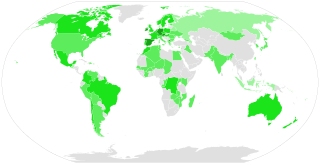Related Research Articles
A coalition government, or coalition cabinet, is a government by political parties that enter into a power-sharing arrangement of the executive. Coalition governments usually occur when no single party has achieved an absolute majority after an election. A party not having majority is common under proportional representation, but not in nations with majoritarian electoral systems.

A green party is a formally organized political party based on the principles of green politics, such as environmentalism and social justice.
The Labour Party is a social democratic political party in the Netherlands.

The Progressive Democrats, commonly referred to as the PDs, was a conservative liberal political party in Ireland. The party's history spanned 24 years, from its formation in 1985 to its dissolution in 2009.

Democrats 66 is a social liberal and progressive political party in the Netherlands, which is positioned in the centre of the political spectrum. It is a member of the Liberal International (LI) and the Alliance of Liberals and Democrats for Europe (ALDE).
The Alliance was a left-wing political party in New Zealand. It was formed at the end of 1991 by the linking of four smaller parties. The Alliance positioned itself as a democratic socialist alternative to the centre-left New Zealand Labour Party. It was influential throughout the 1990s, but suffered a major setback after its founder and leader, Jim Anderton, left the party in 2002, taking with him several of its members of parliament (MPs). After the remaining MPs lost their seats in the 2002 general election, some commentators predicted the demise of the party.

The Croatian People's Party – Liberal Democrats is a social-liberal political party in Croatia.

The New Zealand Social Credit Party was a political party that was New Zealand's third party from the 1950s to the 1980s. It won representation in the New Zealand House of Representatives, holding one seat at times between 1966 and 1981, and two seats from 1981 to 1987. While Social Credit once had significant support, particularly as a protest vote, it was disadvantaged by first-past-the-post voting as it had no geographically concentrated vote. Its most identifiable leaders were Vernon Cracknell (1963-70), who served just one term in parliament, and the household name Bruce Beetham, who rebuilt the party into a significant political force. At its zenith under Beetham in 1981, Social Credit achieved 20.7% of the vote.
The Social Democratic Party of Lithuania is a centre-left and social democratic political party in Lithuania. Founded as an underground Marxist organisation in 1896, it is the oldest extant party in Lithuania. During the time of the Soviet Union, the party went into exile, emerging once again after the end of communist rule in 1989.
An electoral alliance is an association of political parties or individuals that exists solely to stand in elections.

The Alberta Alliance was a right-wing provincial political party in Alberta, Canada. Many of its members were supporters of the defunct Canadian Alliance federal political party and its predecessor, the Reform Party of Canada. Members also joined from similar provincial fringe parties like the Alberta First Party, the Alberta Party and Social Credit. Alliance supporters tended to view themselves as "true conservatives," and believed the Progressive Conservative governments of Premiers Ralph Klein and Ed Stelmach were out of touch with the needs of Albertans.

The Social Democrats is a centre-left and pro-European social-democratic political party in Slovenia led by Matjaž Han. From 1993 until 2005, the party was known as the United List of Social Democrats. It is the successor of the League of Communists of Slovenia. As of 2022, the party is a member of a three-party coalition government with Robert Golob's Freedom Movement alongside The Left, as well as a full member of the Party of European Socialists and Progressive Alliance.

The Democratic Coalition is a social democratic and social-liberal political party in Hungary led by former Prime Minister Ferenc Gyurcsány. Founded in 2010 as a faction within the Hungarian Socialist Party (MSZP), the Democratic Coalition split from the MSZP on 22 October 2011 and became a separate party. It has fifteen MPs in the National Assembly and two MEPs in the European Parliament.
Matthew Peter Robson is a New Zealand politician. He was deputy leader of the Progressive Party, and served in the Parliament from 1996 to 2005, first as a member of the Alliance, then as a Progressive.
John Wright is a former New Zealand politician. He was a member of parliament from 1996 to 2002, representing the Alliance. Before entering Parliament he owned the Port-a-Loo company.
Grant Gillon is a former New Zealand politician. He was a member of parliament between 1996 and 2002, representing the Alliance Party, has held a number of seats in local government. He previously served on the Devonport-Takapuna Local Board representing Shore Action.

People Power (PP) is a populist and radical democratic political party in Hong Kong. Formerly chaired by Raymond Chan, it belongs to the radical wing of the pro-democracy camp.
The Social Credit-NZ party was a political party in New Zealand which split from the New Zealand Democratic Party in 1988.

Parliamentary elections were held in Iceland on 30 November 2024 to elect the 63 members of the Althing. The centre-left Social Democratic Alliance, led by Kristrún Frostadóttir, outperformed the ruling Independence Party to win the most seats, at 15. The election saw the worst performance by the Independence Party, Progressive Party, the Left-Green Movement, and the Pirate Party in each of the parties' histories, while Viðreisn, the People's Party, and the Centre Party saw their best performance in each of the parties' histories. This follows a trend of Icelanders voting against every post–2008 recession government except during the 2021 election.
References
- ↑ "Social Credit Website". Social Credit.
- ↑ "Party Changes Name and Elects New Leader". Democrats for Social Credit. 17 June 2018.
- ↑ "Party Lists of Successful Registered Parties". Electoral Commission . Retrieved 8 April 2017.